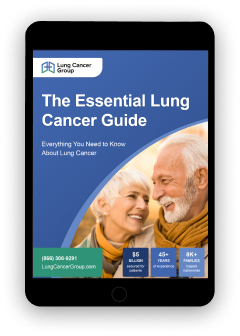Lung Cancer Survivors
Lung cancer is the leading cause of cancer death in the United States. However, it is possible for people to survive 10 or even 20 years after their lung cancer diagnosis if it is detected and treated early. Learn about key factors that can affect if you’ll become a lung cancer survivor.
Can You Survive Lung Cancer?
 Possibly, yes. Though lung cancer kills more people than any other type of cancer and has a poor long-term survival rate, it’s possible to become a survivor.
Possibly, yes. Though lung cancer kills more people than any other type of cancer and has a poor long-term survival rate, it’s possible to become a survivor.
Lung cancer patients may survive for years or possibly decades after their diagnosis. Various factors will improve the likelihood of becoming a lung cancer survivor.
Patients who are in generally good health and diagnosed in the early stages of non-small cell lung cancer tend to have a much better chance of lung cancer survival.
Lung cancer treatment is the best way to become a lung cancer survivor. Treatment, however, can be costly, leaving many overwhelmed. Thankfully, there are resources to help.
If you were exposed to a cancer-causing substance called asbestos and later developed lung cancer, you may be eligible for financial compensation to help cover the cost of treatment.
Get a Free Lung Cancer Guide and explore stories of lung cancer survivors right now.

- Understand risk factors
- Find top treatments
- Pursue compensation



Lung Cancer Survivor Stories
There are several lung cancer survivors, whether diagnosed early or in later stages who, thanks to advances in lung cancer treatment, have beaten the odds of their disease.
Some lung cancer survivor stories include:
- Brandi was diagnosed with advanced lung cancer in 2018. After undergoing chemotherapy, immunotherapy, radiation therapy, and targeted therapy, her lung cancer scans were clear. She has remained in remission for nearly 5 years.
- For over two decades, David has survived lung cancer after surgery. He has become a dedicated advocate for lung cancer research with the Lung Cancer Foundation of America.
- Emily was diagnosed with stage 4 lung cancer at only 28 years old. She has survived for more than 10 years.
- Jim is a lung cancer survivor diagnosed in 2005 who also has asbestosis. He has lived for nearly 18 years with the help of treatment.
Lung cancer patients may feel overwhelmed by growing medical expenses. You may be eligible for financial assistance for your life-extending treatment. Contact us today to see how we can help you.
Factors That Affect Lung Cancer Survival


Learn about each factor influencing lung cancer survival below.
Early Detection
The earlier a patient is diagnosed with lung cancer, the more likely their cancer is in an early stage and has not yet spread to other parts of the body. As a result, they will have more cancer treatment options, which means they may have a longer life expectancy.
Overall Health at Time of Diagnosis
Patients with better overall health are more likely to become long-term lung cancer survivors. That’s because healthier people have stronger immune systems for fighting cancer cells. Additionally, they may recover from surgeries or other treatments with fewer complications.
Patient Age
Younger lung cancer patients generally have higher life expectancies than older patients. This is because younger patients generally are in better health and are able to better withstand major treatments.
Type of Lung Cancer
Some types of lung cancer are easier to treat than others, meaning some patients may live longer than others.
The two main types are lung cancer are:
- Non-small cell lung cancer (NSCLC): NSCLC is the most common type of lung cancer cases. According to the American Cancer Society, the overall 5-year survival rate for NSCLC is 28%.
- Small cell lung cancer (SCLC): SCLC is a less common type of lung cancer and unfortunately has a poorer prognosis (overall health outlook). According to the ACS, the 5-year survival rate for SCLC is 7%.
What Remission Means for Lung Cancer Survivors
Lung cancer remission means that the signs and symptoms of your lung cancer are significantly reduced or gone completely.
Lung cancer survivors who achieve remission will still need to see their doctors regularly for routine screenings, as they aren’t considered cured.
Lung cancer, unfortunately, does have a high recurrence rate. This means that, even after lung cancer survivors have entered remission, it could return.
If lung cancer recurs, you may experience the same symptoms as before. However, depending on your health and the cancer type and stage, your care team may recommend different treatment approaches.
It’s important to work closely with your oncologist (cancer doctor) to continue working towards survivorship.
Get a Free Lung Cancer Guide to explore treatments that could help you enter remission and become a survivor.



- Understand risk factors
- Find top treatments
- Pursue compensation



Improving Your Chances of Becoming a Lung Cancer Survivor
There are steps you can take to increase the likelihood of surviving past your initial lung cancer prognosis, including the following.
1. Find the Most Effective Treatment for Your Diagnosis
First, you need to find the right lung cancer doctor. Top oncology specialists can diagnose lung cancer early and create personalized care plans for you.
They can also provide follow-up care and help you manage side effects associated with treatments like chemotherapy.
A lung cancer doctor can also see if you are eligible for new treatments such as those available through clinical trials. These therapies may help you become a survivor even if your cancer doesn’t respond to standard treatments.
2. Seek a Second Opinion
Because lung cancer symptoms often get mistaken for less serious conditions, doctors may make the wrong diagnosis. This can prevent you from getting an accurate lung cancer diagnosis and treatment on time.
That’s why you should get a second opinion from another doctor. A second oncologist can order additional blood biomarker tests, biopsies, and X-rays to confirm your care team’s diagnosis. They can also ensure that you are on the right course of treatment.
3. Find Emotional Support and Resources
A lung cancer diagnosis can be stressful and traumatizing.Seeking emotional support and resources can help you maintain a positive outlook and improve your quality of life. Besides joining online support groups, you can attend in-person lung cancer support groups or talk to a licensed counselor.
Get Help Affording Treatment and Becoming a Lung Cancer Survivor
Receiving a lung cancer diagnosis can be stressful and confusing, especially when lung cancer treatments are expensive. In fact, lung cancer treatment can cost more than $140,000 without insurance — a cost that can be devastating for many families.
Thankfully, Lung Cancer Group is here to help. If you were exposed to asbestos and later developed lung cancer, you may be eligible for financial assistance to help cover treatment costs.
Get a Free Lung Cancer Guide to hear from other lung cancer survivors and find medical and financial options that could help you.
FAQs About Lung Cancer Survivors
Are there survivors of lung cancer?
Yes, some lung cancer survivors can live for 10 years or even more after their lung cancer diagnosis.
Can you fully recover from lung cancer?
Possibly, yes. Some patients who are diagnosed and treated early may achieve lung cancer remission. This means that signs and symptoms of lung cancer are reduced or gone completely.
The most important factor in fully recovering from lung cancer is by detecting cancer early and undergoing treatment as soon as possible.
Get a Free Lung Cancer Guide to explore treatments that could allow you to recover from lung cancer.
Can you live a normal life after lung cancer?
It is possible to live a normal, active life after lung cancer, even if surgeons have removed all or part of a lung. Talk to your health care team to learn more about what activities you can and can’t do as a lung cancer survivor.
Additionally, lung cancer support groups can also help you cope with complex emotions and learn to adapt to life after lung cancer.
Can you live 20 years with lung cancer?
Possibly, yes. If doctors catch and treat your lung cancer while it is in its early stages, you may be able to live for another 20 years.
Research by Mount Sinai Hospital has shown that patients diagnosed with early-stage lung cancer via computerized tomography or CT scans have a 20-year survival rate of 80%.

